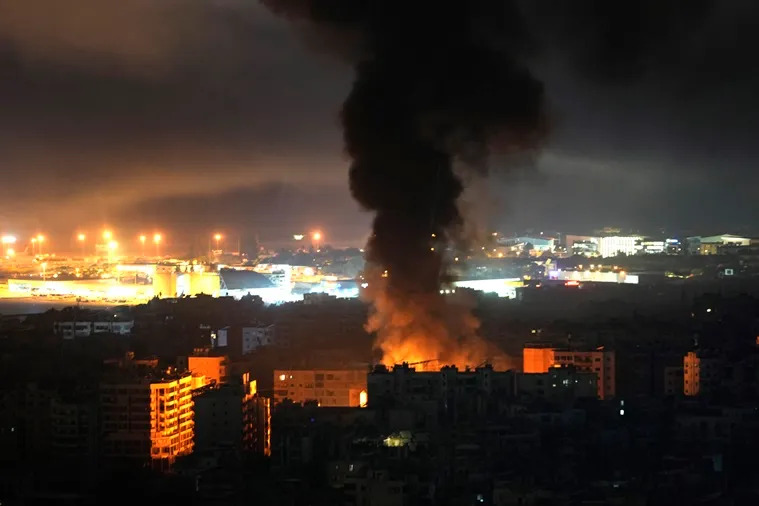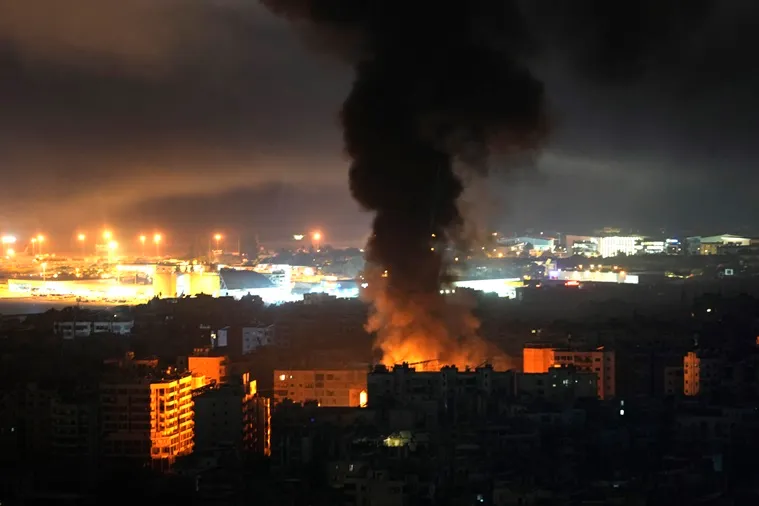Israel-Iran War : Escalating Conflict: A Year of Turmoil in the Israel-Iran War
As we approach the one-year anniversary of the tragic events of October 7, 2023, when Hamas launched a surprise attack on Israel, the ongoing Israel-Iran news war reveals a complicated and escalating crisis. This conflict has deepened with the active involvement of Hezbollah from Lebanon, compounding the existing tensions and violence in the region. The Israeli-Palestinian conflict continues to evolve, prompting urgent calls for humanitarian intervention and international attention.
A Year of Heightened Tensions
Since the onset of the 2023 Israel–Hamas war, hostilities have only intensified. Recent reports indicate that more than 1,800 children are currently sheltered in United Nations facilities, with a staggering 200,000 people having migrated from Lebanon to Syria amidst escalating violence. These statistics highlight the devastating humanitarian impact of the conflict, which has displaced countless families and created a dire need for humanitarian aid.
The Israeli Defense Forces (IDF) have conducted extensive operations targeting both Hamas and Hezbollah. In an assertive statement, IDF Chief Lt Gen Herzi Halevi announced that Israeli forces had delivered a “severe blow” to Hamas’s military wing and claimed to have neutralized Hezbollah’s senior leadership. However, the cost of this military campaign is heavy, with reports of significant civilian casualties and damage in both Gaza and Lebanon.
The Haifa Attacks
Recent developments have seen Hezbollah launch rockets into Israel, including attacks on the port city of Haifa. Five rockets struck the city, injuring several civilians and damaging infrastructure. The Israeli National Emergency Service reported that a 20-year-old man suffered serious shrapnel injuries. This escalation signals a strategic shift by Hezbollah, indicating their ability to target urban centers rather than solely military installations.
On the ground, the situation remains precarious. As the IDF continues its operations, Hezbollah has reportedly launched drone attacks against Israeli military bases, demonstrating their operational capabilities and commitment to retaliate. With ongoing rocket fire and airstrikes, Israeli citizens live under constant threat, leading to heightened anxiety and a state of emergency.
International Responses and Travel Advisories
In light of the escalating conflict, various countries have issued travel advisories. The United Kingdom has advised its citizens to avoid all travel to Israel and the Occupied Palestinian Territories (OPTs). The Foreign, Commonwealth and Development Office (FCDO) issued a statement underscoring the risks associated with traveling to areas close to the Gaza border.
Global leaders are engaging in diplomatic discussions to address the crisis. Recently, French President Emmanuel Macron and Israeli Prime Minister Benjamin Netanyahu held a phone call where they acknowledged their differing perspectives on the conflict. Macron emphasized France’s unwavering commitment to Israel’s security while cautioning that arms deliveries and the continuation of military actions in Gaza would not enhance security for Israelis or others in the region.
The Humanitarian Crisis
The United Nations High Commissioner for Refugees has condemned the bombardment of Lebanon, stating that several strikes by Israel have violated international humanitarian law. The situation for civilians in both Lebanon and the Gaza Strip is dire. Reports indicate that at least 20,000 Palestinians have been forcibly displaced due to Israeli airstrikes in Lebanon, further exacerbating the humanitarian crisis. The UN agency for Palestinian refugees, UNRWA, has activated emergency shelters for those affected, illustrating the urgent need for humanitarian aid.
Pope Francis has also made a renewed plea for peace, calling for a day of prayer and fasting to mark the anniversary of the October 7 attacks. He expressed solidarity with the Israeli people while urging for an immediate ceasefire and highlighting the humanitarian needs of civilians in Gaza and Lebanon. The Pope’s message resonates with many around the world, emphasizing the urgent need for dialogue and conflict resolution.
Iran’s Role in the Conflict
Iran continues to play a pivotal role in the dynamics of this conflict. Following Israeli airstrikes in Beirut, Iranian Quds Force commander Esmail Qaani was reported missing, raising questions about Iran’s operational involvement in the region. His presence in Lebanon underscores the extent to which Iran supports militant groups like Hezbollah and Hamas.
Israel’s defense minister has issued stark warnings, stating that “everything is on the table” regarding potential retaliatory actions against Iran. This rhetoric hints at a broader conflict that could extend beyond the borders of Israel and Lebanon, affecting regional and global security.
The Broader Implications
The implications of the ongoing conflict reach far beyond the immediate region. The world’s attention has also been diverted by the Ukraine-Russia war, yet the situation in the Middle East remains critical. As tensions rise, there are fears of an all-out war that could engulf not only Israel and Hezbollah but also involve Iran, potentially drawing in other global powers.
The ongoing violence also places pressure on domestic issues within Israel. As the Israel national football team prepares for international matches, the juxtaposition of sports and conflict illustrates the challenges of maintaining normalcy in a nation under threat. Citizens are grappling with the reality of living in a conflict zone while trying to find solace in everyday life.
Conclusion
As we reflect on the events surrounding the October 7 attacks and the subsequent escalation of conflict, it is clear that the situation is more urgent than ever. The humanitarian toll continues to mount, and the need for immediate action is paramount. Global leaders must come together to find solutions that prioritize peace, safety, and dignity for all affected by this protracted crisis.
The Israel-Iran war, coupled with Hezbollah’s aggression and the plight of Palestinians, presents a complex challenge that requires concerted efforts from the international community. It is vital to foster dialogue and understanding to pave the way for a lasting resolution that can finally bring an end to the cycles of violence that have plagued the region for decades.
Only through collective efforts can we hope to witness a future where the voices of the people—whether Israeli, Palestinian, or Lebanese—are heard and respected, paving the way for peace and stability in the Middle East.

